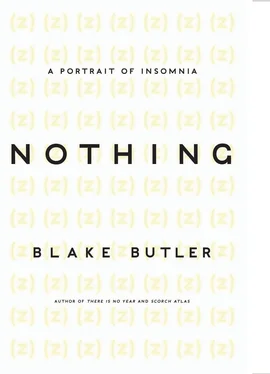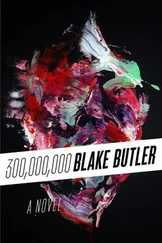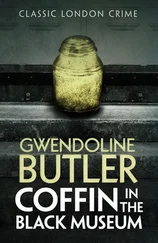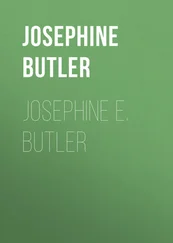]
]
]
And so how the fuck under this false ceiling and its false ceiling and the house and all this meat now do we relax? What in one hour might seem the best thing might in another scream a knot, make one want to hit one in one’s mouth. Beyond even just the far-off future, there is the present minute of having constant day in constant time, a hundred ways to spin in any intuition. All these arts asking questions left unsaid. All these doors and hallways prying open and looming open and awake. The weight of decades of human dreaming. And every second, seen or unseen, within and around our heads, the spread. Each idea stung with all its gather. The unindexed histories of contexts and accusational collisions and theories, exponential. Imagine our history’s quantified timeline ideas translated into thicking glass — glass growing out and thicker in our air there, unseen. How difficult it can seem sometimes to breathe. And with that, the growing contention of how obvious all of this light is. How well we already know what we are underneath. How we are expected to keep curving. Reaching. Eating. Going. Hello. Hello. Hey.
“Just get wasted” is a common response from a lot of people when sleeping trouble is brought up. Indeed, being drunk, if not quite parallel to entering the unconscious via dreaming, affords rooms within rooms, warbled hallways, multiplying doors, ones often unremembered in the sobering process, through which the body, often, when forced to return, becomes ill. Much like a role-playing game’s “summoning sickness,” wherein new characters are unable to act in early rounds of their invocation due to the trauma there involved in being brought into the field, coming back out of the drunk state reiterates some common side effect of sleep medication, and insomnia: dizziness, nausea, exhaustion, sweating — damage.
But drunk sleep is shallow, prone to exit. The architecture of the unconscious rooms is nearer to the brain, deflating dream components under muffle, often unremembered, zapped. Like those faking their way through exercises seeing no results, the aggregate of many consecutive days of sleep through beverage-based sedation can pile up on the body, rested and not rested, groggy, gross. Sleep without the drink then might seem even harder, and more required to feel full. The doors, as with all forms of such influx, grow wider, their halls thereafter nearer-walled. Something greased in the gears of that depressant as an entry, dragging the cells down heavy, as with the same caloric fat in breakfast cereal, though also in the loosening of the cheeks and meat around the brain — a state not that far off from early insomniac gyration, where the air feels different but also new. Staying awake seventeen hours has been equated, in the drop of performance, to a blood-alcohol-content level of 0.05 percent (one to two beers, depending on your beef), and further corresponds in ruined performance with continued deprivation. In the same way, the effect of alcohol rising in the bloodstream begins with onset euphoria, which becomes lethargy, which becomes confusion, which becomes stupor, and, finally, coma, heading, again, toward death.
On particularly nasty nights post — high school, up late sweating in small apartments looking hard on into machines, I preferred the slur of NyQuil. At first I used the serving cup and filled it full twice, a double serving, justified by my frame. Lying down with that thick liquid purple light leaking inside me seemed to promise untold fortunes — like now, with its warnings of “marked drowsiness” and warnings against using while “operating machinery,” the substance turning on all through the blank spots there inside me, I could at last go quiet, lurch off, under the warming ceiling spreading out through my insides. Its bouquet like doctor’s exam-table paper and cheap tacky candy, bite like melted plastic child slides, aftertaste like licking the linings of a rarely ever worn winter coat — or something — still the head swims lightly. Still, a little jostle, slot machines, a slow stirring around the shoulders, at the skull’s edge a muffle lamp. Other nights two servings would say nothing, and still hours later I’d be in the same spot anywhere, if that much more groggy underneath the antihistamine. One thing about chemically altering the door of your coming and going is that when they don’t seem to click, the frustration becomes that much more severe. This door, even with these keys, did not open. So now then I need more keys that push harder. I must cut through all the locks. So I took more NyQuil. I’d swig off it fat-lipped, get half a bottle in, the slicky throttle of it enough to suggest drowse by perfume and lick alone. Maybe a few swigs in a row until it seemed right. Whichever. Drink enough until you can feel it in your head.
Still on the OTC side of the barnyard, Benadryl could work also, or any of the countless antihistamines — nonprescription sleep pills, the allergy medicines, the “night aids” and bedtime versions of other basic medications — Tylenol PM and what have you — each of which, by turns, I sucked down, depending on what there was around. Four or five Benadryl felt like light to lay inside, a humming, the warm rubbed rind of its waving coming on, if still not causing the over-thinking to black out, then at least there lapping at my body like a blanket, waiting — or seeming waiting , to one of the other me inside of me — for some small lapse in the obsess-chain, a slow down, so that therein we could slip in, gone, in witching hour. And the more you take the more you believe, the more you need to make yourself think it’s setting in, though underneath all this expectation what you don’t hear so often is that increasing antihistamine dosage doesn’t cause a comparable increase in response. While they benefit from having no side effects, and working better than a placebo, there’s only so much gain to glean from eating up those basic agents. A pat on the head, a little padding, but ultimately, through most hours, little more than something like a jacket, worn.
Worn, too, are the books that offer logic for the exit from the barrage, constrained advices aimed less at direct motions and more like overall life guides: Set up regular bedtimes and rising times, including holidays and weekends, certain books will tell you, milking on the body’s wanting to be programmed, made a box. The funny thing about this advice, though, is that another common piece, often listed in the same spiel, is: Don’t get in bed until you’re tired. Don’t spend extra time in bed awake reading or watching TV; only sleep until you’re rested; don’t nap.The wider logic here would be to set up a time in scheduling when you are usually tired enough on most days to be ready when it hits, but inside the wide strain of stimulus, continuous redressing, constant input, and so on, it seems harder now than ever — and again growing by the minute — to predict where the body is meant to be. Not to mention the frequent further advice of Don’t flop in the bed for longer than thirty minutes; if you can’t sleep get up and read or watch TV until you’re tired, which has the benefit of removing the frustration period, but also further displaces the timeline. The people I know who seem to tend toward those regular settings are those programmed by their nine-to-five, most of whom having been at it so long they know to fit their obsessing and consuming into a specific set of slots — I watch TV now, I shop now, I eat at this time, when I want to go to bed I go to bed. Concerns of territorializing the environment of the sleep state. Building inertia, consecrating space; the idea being that if you can decenter the errored condition in the blood, by negotiation and conditioning, rather than meds, you can change the expectation, the nature, and emerge clean. Schedule worry time during the day, suggests another fragment of advice, which alone seems so insane and off base, as if anxiety were a muscle one could gather up and outlay only in a 3' × 3' square section of the dining room partitioned off under thick glass — though really, such rigor and demonstrative restraint seems cozy, even expected, in the fields of office buildings and neon shopping space, where behavior out of the frame could not only cause one to look bananas, but could result in further repercussions, psychic leakage.
Читать дальше












